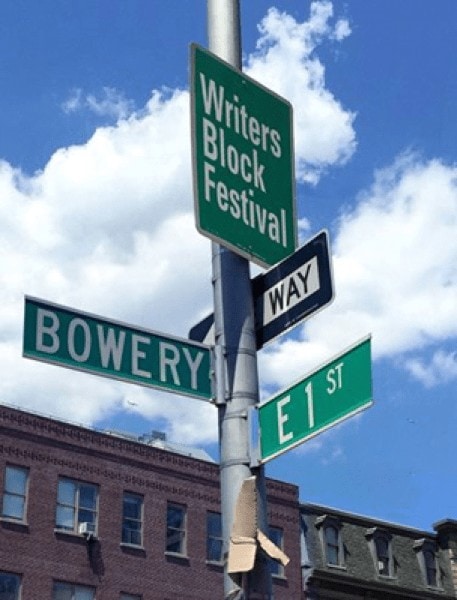
Downtown Music Productions La création du mondeand Mahagonny Songplay
Downtown Music Productions La création du mondeand Mahagonny Songplay
Part of Howl!’s annual Writers Block staged reading and performance festival
For Tickets to Downtown Music Productions
La création du monde by Darius Milhaud
Downtown Chamber & Opera Players
Mimi Stern-Wolfe, Conductor
and
Mahagonny Songplay (1927)
Notes from Lys Symonette of The Kurt Weill Foundation
Music by Kurt Weill
Text By Bertolt Brecht
Howl! Happening is pleased to present an evening with the Downtown Chamber & Opera Players as part of Writers Block, a festival of staged readings and performances to benefit the Actors Fund. The festival is a benefit for the Howl! Emergency Life Project (Howl! HELP), which provides emergency financial assistance and social service support to artists who have made or continue to make their careers in New York’s East Village and Lower East Side arts communities. 100% of the proceeds from ticket sales benefit the Actors Fund.
Get your tickets here.
Kurt Weill was born on March 2, 1900 in Dessau, Germany. He was the son of the Jewish cantor of a local synagogue. The Mahagonny Songspiel marked the beginning of Weill’s collaboration with Brecht, whom he met in 1927 and whose poetry stirred him deeply. Lotte Lenya has described her husband Weill’s feelings of wanting to bridge the wide gap between composers and the great public. With Brecht, he searched for new ways of accomplishing this goal. Challenging attitudes with fresh approaches, the repertory stirred a great deal of controversy. His other collaborations with Brecht include The Threepenny Opera, which enjoyed an overwhelming popularity in the United States when it was presented to theatre audiences after Weill had emigrated.
Mahagonny was intended by Weill and Brecht to represent a mythical place—for Germans, it was usually a place in America. It was a sort of utopia of the petite bourgeoisie—a world where hedonistic pleasures coupled with society’s growing political turmoil led to eventual chaos and total ruin. The Mahagonny Songspiel premiered in July 1927 in Baden Baden, last on a program of operas by Toch, Milhaud, and Hindermith. Part of the audience was enthusiastic; others were both shocked and disgusted by the piece. Brecht prepared the cast for the worst. Whistling in Germany is the most severe type of disapproval, and so Brecht supplied all his cast members with whistles of their own, so they could whistle right back—which they did!
By the early 30s, political tensions in Germany had come to a full boil. Nazi demonstrations and general protests grew to great proportions, particularly over Weill’s musical play Der Silbersee (The Silver Lake). Further performances were canceled. Both Weill and Lotte Lenya were advised to leave. They ran away to France where they stayed a short time before leaving Europe forever and coming to the United States. There, Weill continued composing and wrote for the Broadway stage with other librettists until his death in 1950. His music in the United States was less acerbic than in Germany. He was capable of great stylistic diversity; his genius was that he adjusted musical lines, rhythms, and harmonies to the specific needs of every dramatic piece he created.
The Downtown Chamber Players in Mahagonny Songspiel include Justin Vance and Steve Lyon on clarinets, Stephen Fillare on violin, Robbie Harvey on alto saxophone, Clyde Daley and Terry Szor on trumpets, Ron Hay on trombone, Peter J. Saleh on percussion, and Elizabeth Rodgers on piano, with Mimi Stern-Wolfe conducting.
The piece is sung by four men who intend to travel to Mahagonny—a place where things are supposed to be ideally beautiful—and two women who are disillusioned with the Old World and keep searching for material happiness. Life in Mahagonny is described—we see characters drinking; playing cards; whoring; seeking dollars, boys and whiskey; getting bored. God, one of the four men, is threatened after he orders them to Hell. But they say they are already there. Protest marches are staged; the city goes up in flames. The moral of the tale is quietly spoken in the finale by Bessie. The characters have demonstrated their excesses and limitations.
CAST
Charlie: Charles Calotta, tenor
Billy: Justin Michael Austin, baritone
Bobby: Jorell Williams, baritone
Jim, God: Charles D. Carter, bass
Jessie: Karla Simmons, soprano
Bessie: Darcy Dunn, mezzo-soprano
STAFF
Musical Direction: Mimi Stern-Wolfe
Stage Direction: Katrin Hilbe
Projection Design: Klay James-Enos
Costume design: Cathy Small
Lighting Design: Carter Edwards


